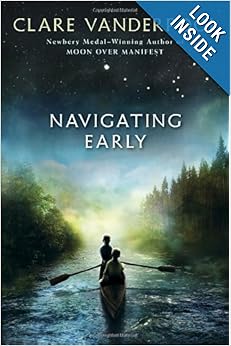 What a delight! Navigating Early is just the kind of novel that the Newbery award-givers, who have already awarded Ms. Vanderpool’s first book, Moon Over Manifest, a Newbery Award, would love. And I loved it, too. Kids I’m not so sure about, but it might very well find its own audience.
What a delight! Navigating Early is just the kind of novel that the Newbery award-givers, who have already awarded Ms. Vanderpool’s first book, Moon Over Manifest, a Newbery Award, would love. And I loved it, too. Kids I’m not so sure about, but it might very well find its own audience.
As I was reading the book, I was first reminded of the movie Dead Poet’s Society. Navigating Early takes place in Maine in a boy’s prep school and in the woods nearby. Thirteen year old Jack Baker, having recently experienced the death of his mother, is a new student at the school since his father doesn’t know what else to do with him. There’s a quirky (math) teacher who tells the boys that math is a quest, just like the Arthurian knights’ quest for the Holy Grail.
Then, the focus changes to a boy that our narrator meets, “Early Auden, that strangest of boys.” Early is quite strange:
“He listened to Louis Armstrong on Mondays, Frank Sinatra on Wednesdays, Glenn Miller of Fridays, and Mozart on Sundays. Unless it was raining.
If it’s raining, it’s always Billie Holiday.
I had heard of Billie Holiday, the jazz and blues singer, but I’d never really listened to her sing. Her voice mixed with the music like molasses with warm butter.”
Even stranger, Early Auden is obsessed with the number pi, a number whose “decimal representation never ends and never settles into a permanent repeating pattern.” In Early’s odd and complicated mind, pi’s numerals embody shapes and textures and colors, and ultimately the numbers of pi tell a story, the story of a boy named Pi. The story of the boy Pi intertwines and meshes with the story of Jack Baker and of Early Auden, and somehow it all has to do with a Great Bear, a boat, pirates, an ancient woman, and a lost boy.
The theme of lostness and lost and found-ness is repeated throughout the story. Jack is lost without his mother. Early is lost without his brother who died in France in World War II. His brother, according to Early, is the one who is lost. Jack’s father is lost without his wife. The number pi is, according to a famous mathematician, losing digits.
“I really was adrift. No tether. No anchor. I saw a sudden burst of lightning, and my pulse quickened. There was something intoxicating about being completely alone and unaccounted for. I could travel to California or Kentucky or Kansas, and no one would even know I was gone until the following Sunday, when everyone would return to school. Of course, I didn’t really know how to go to those places. That was the nature of being lost. You had freedom to go anywhere, but you really didn’t know where anywhere was.”
Isn’t that true? We all have more freedom than ever before in history. We can go anywhere, do anything, but quite a few of us don’t know where anywhere is.
The book began to remind me of Don Quixote as I continued to read about these two lost boys and their quest in the woods of Maine. Early Auden is Don Quixote, tilting at windmills, following his quest, and sure of the righteousness of his cause. Jack is Sancho Panza, disbelieving but willing to come along and wanting to believe that Early has some special insight into finding the object of their quest. There’s even a girl (Dulcinea?), whom Early renames Pauline instead of her given name Ethel.
Then, I realized that Early and his alter-ego Pi were reliving the story of Odysseus. The boys encounter pirates, are rescued by a Great White Whale, are captured by an ancient enchantress, listen to a siren-song, journey through the catacombs, and eventually return home, after their long quest is ended.
I’m sure all of these echoes of famous stories, and probably some others that I didn’t pick up on, were intentional, and they made the story richer and more fun for me. I don’t know how many children would see the parallels, but they might enjoy the story for its surface meaning and its curious strangeness. Readers who have read and enjoyed the story of Odyseuss or those who like Gary Schmidt’s richly layered middle grade novels about boys and imagination, or perhaps fans of Alice in Wonderland or Don Quixote or of N.D. Wilson’s Leepike Ridge should definitely give Navigating Early a try. Navigating Early is also somewhat reminiscent of the adult novel Extremely Loud and Incredibly Close by Jonathan Safron Foer. Lots of echoes, and a credible entry into the Great Conversation. (Yes, I believe the best children’s literature is worth adult reading, too, and adds to the the Great Conversation just as much as or better than most “adult” books do.)
I have this one from the library for the second time, but this time I’m moving it to the top if the stack!
Pingback: Navigating Early by Clare Vanderpool | Hope Is the Word
Pingback: Sunday Salon: Books Read in October, 2013 | Semicolon
Pingback: Seven Things That Made Me Smile in April | Semicolon